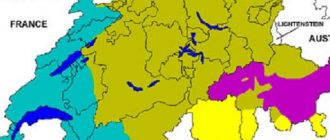Argentina has become more visible in recent years, due, in part, to a favourable exchange rate for stronger currencies. This has led not only to more overseas visitors touring this varied and beautiful country but also to people who are looking to live in a cheaper place than their home country because of the effects of the world economic crisis.
LEVEL OF ENGLISH IN ARGENTINA
Most of the younger generations of Argentines will have studied some English at school and will have a first acquaintance with the language. This is generally backed up in middle class families by sending their children to private institutes where they can get a better grounding attending two or three times a week after school. Adults who need English for their work or travel will also attend these institutes on and off throughout their lives as the need dictates. English for specific purposes is often required for university studies.
Many larger towns will boast a private bilingual school or two where the children have the Argentine curriculum in Spanish in the morning and English lessons in the afternoon.
In Buenos Aires, there are some well-established bilingual schools with the curriculum taught both in Spanish and English. These schools in the main were set up by the British community which went to build the railways in Argentina at the beginning of the 2Oth century and this is why ‘British English’ is more common than ‘American English’ in Argentina rather than the other way round as in the other Latin America countries. That is to say the Argentine teachers of English come out of teacher training with a more ‘British’ pronunciation.
The main problem of English language learning in Argentina is the lack of interaction both with people who speak English as their mother tongue and with those who use it as a means for international communication as Argentina is at the tail end of the world. Those involved in some aspect of the tourist industry are the most exposed or who work for a multinational firm. This means that although many people may have taken English lessons for years, they find themselves very shy or ashamed when it comes to speaking and will say they can’t speak English when in fact they’ve a good grounding but have never had much chance to hold a conversation.
The other factor to be taken into consideration is that Argentina is surrounded by Spanish or Portuguese speaking countries so travel does not mean taking on board another language. The Argentine middle class, in times when the Argentine peso has a favourable exchange rate with the dollar and the euro, are the ones who travel abroad and would find themselves using English for international communication.
TEACHING EFL
*Remember that Argentina is in the southern hemisphere and the school year starts in March and ends in December with a short winter break in July.
The population of Argentina is around 40 million nearly half of which live in Buenos Aires and Greater Buenos Aires so obviously there will be more work possibilities in this big city. However, there are other sizeable cities, like, Rosario, Córdoba, Mendoza, Santa Fé, Bariloche, Mar del Plata and other smaller ones all over Argentina where you may find opportunities for teaching EFL. Wherever you are, there is sure to be a demand for English lessons.
PUBLIC SCHOOLS
The Argentine government is encouraging the teaching of English in the public (state) schools with elementary English in some primary schools and obligatory English in the high (secondary) schools. The level is not very high.
However, it would be very difficult to find work in the public system as a foreigner and getting foreign university degrees and teaching certificates revalidated is a lengthy, if nigh impossible bureaucratic procedure.
PRIVATE INSTITUTES
There is a strong desire of behalf of the Argentine middle class to ensure that their children study English and in any reasonably sized town in Argentina there is a plethora of private institutes offering English classes and where the teachers are generally Argentines except in the big cities like Buenos Aires where there is more opportunity to find work as a native teacher.
Some institutes are part of international franchising for example, International House, Berlitz, Icana and others, which can be approached through their web page on line or directly in their offices. These will be mainly in Buenos Aires.
https://ihworld.com/school/profile/ih_buenos_aires_recoleta
https://ihworld.com/school/profile/ih_buenos_aires_belgrano
https://www.berlitz.com/Contact/Welcome-to-Berlitz/85/countryid–9/
https://www.icana.org.ar/
BILINGUAL SCHOOLS
In Buenos Aires, there are many bilingual schools with the curriculum both in Spanish and English and which do employ native speakers. To teach in these schools you would need a university/college degree, a teaching training certificate and there would be the opportunity to teach other subjects.
In other big cities, like Cordoba, Rosario, Mendoza, Mar del Plata, Bariloche and other cities there are bilingual schools and it is a question of doing some research on line or in the city you find yourself in or want to go to and then approach the school to see if there is any opportunity for teaching.
INTERNATIONAL SCHOOLS
There are a few well established international schools where students can take the international baccalaureate and other international certificates.
https://www.easyexpat.com/en/guides/argentina/buenos-aires/school/international-schools.htm
PRIVATE TUTORING
In the big cities, there is opportunity to arrange for private classes. This can be arranged with people you get to know and through advertising.
https://www.buenosairesherald.com/
There are plenty of multinational firms and there is the possibility to offer in-house training.
Of course, on line teaching can be another option if there is a fast internet connection for using Skype.
VOLUNTARY WORK AND WORK EXCHANGES
There are opportunities to exchange your language skills for board and lodging. Again search the web for sites offering voluntary work.
For click here for link to work exchange
QUALIFICATIONS
In some cases, it is enough that you are a native speaker of English. However, you will stand a better chance and you will also feel more confident yourself as English is a funny language to teach (!), if you have some certificate for teaching English as a foreign language like CELTA which is well recognised all over the world.
There are plenty of courses online to this end and it is a question of searching the web and deciding what is viable for you. It is important to make sure the qualification is recognised worldwide. You may decide to do such a course in your own country before you leave on your travels.
There is also the possibility of getting a TEFL (Teaching English as a Foreign Language) qualification in Buenos Aires:
https://www.ih-buenosaires.com
https://www.ih-buenosaires.com
Make time to write a good and attractive CV highlighting your education, qualifications and experience.
Guidelines for writing a CV
https://www.teacherkick.com/blog/how-to-write-a-teacher-resume/
SALARIES AND COST OF LIVING
Argentina has a very unstable economy and inflation is rampant most of the time.
If you get work in a bilingual school or important institute, you will probably have a contract, pay taxes and have some health insurance.
However, working for small language institutes you might find yourself working ‘en negro’, that is, for cash without a contract. This would also apply if you gave private classes in your home or at the student’s home. The Argentine government is gradually working towards all payments ‘en blanco’ but there is still a lot of work done without declaring it to the AFIP or tax office. If you aren’t that visible you can get away working ‘en negro’ as many Argentine do anyway!
It is difficult to say with certainty, depending when you read this article, how much money you need to earn to cover the cost of living as Argentina has high inflation of at least 20% and probably more. Maybe you are offered an initial salary or rate and in a few months find that it is completely devalued.
If you are only living on your earnings you might be hard pushed to make ends meet depending how much work you can get or are willing to do. If you have savings and income in other currencies you might well find Argentina much cheaper than your home country. And of course it all depends on your life style!
https://www.numbeo.com/cost-of-living/city_result.jsp?country=Argentina&city=Buenos+Aires
VISAS
Tourist visas last for 90 days so if you are planning to stay for longer you have several options.
There are other cities, for example, Bariloche, Mendoza on the Chilean border and other cities on the Bolivian, Paraguayan or Uruguayan borders, and you should contact the local Migrations Office to get full information
If you are a US citizen you will need to pay up a Reciprocity Fee online before entry into Argentina
Work visas would be available only if you had a contract with an important firm doing the arranging.
HEALTH CARE
There is free basic medical care in the public hospitals though you are encouraged to make a contribution for medicines used and if you can afford it. You are unlikely to have access to private health care unless you work officially for a large company and have a work contract. It is advisable to have a travel insurance which covers medical expenses.
GENERAL INFORMATION ABOUT ARGENTINA AND TEACHING EFL
*Some sites may not be updated and therefore the quoted cost of living will almost certainly be out of date.
https://www.argentinaindependent.com/
https://www.gooverseas.com/teach-abroad/argentina
https://www.internations.org/buenos-aires-expats
https://www.expatarrivals.com/argentina/buenos-aires/education-and-schools-in-buenos-aires





